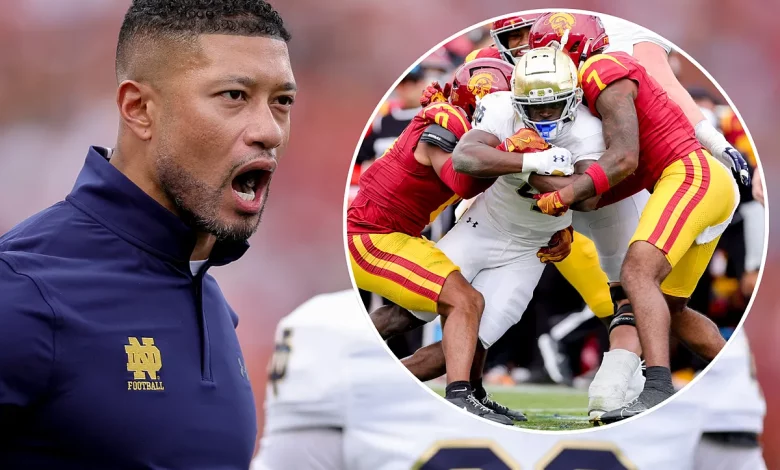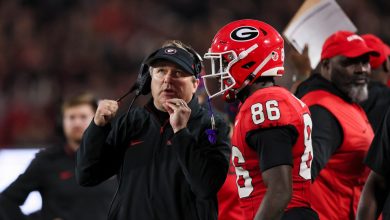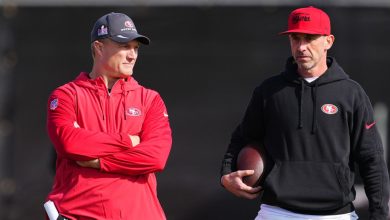Marcus Freeman hopes the Notre Dame-USC rivalry endures forever, saying, “It don’t matter when we play ’em.”

College football is filled with intense rivalries that ignite passion, drama, and unforgettable moments. Among these storied matchups, the Notre Dame vs. USC rivalry stands as one of the most iconic in the sport’s history. Recently, Notre Dame head coach Marcus Freeman expressed a heartfelt desire for this legendary rivalry to continue indefinitely, emphasizing that the timing of the games matters little compared to the enduring spirit of competition between the two programs.
Freeman’s candid reflections underscore not only the significance of the rivalry itself but also the broader importance of college football traditions in connecting past, present, and future generations of players and fans. In this article, we’ll explore the history and impact of the Notre Dame-USC rivalry, delve into Freeman’s comments and vision, and consider what the future might hold for one of college football’s greatest showdowns.
A Rivalry Steeped in Tradition
The Notre Dame Fighting Irish and the USC Trojans first clashed on the gridiron in 1926, sparking a rivalry that has since become synonymous with tradition, prestige, and intense competition. Over nearly a century, this rivalry has produced classic games, legendary players, and moments etched into college football lore.
The two programs are iconic in their own right—Notre Dame with its storied independent history and national championship pedigree, USC with its rich tradition in the Pac-12 and its reputation as a football powerhouse. The rivalry bridges coasts and cultures, adding a layer of excitement unmatched by many other matchups.
Fans from both sides eagerly anticipate the annual showdown, a game often pivotal for conference standings, bowl considerations, and national title aspirations.
Marcus Freeman’s Vision: A Rivalry Without End
Marcus Freeman, who took over as Notre Dame’s head coach with an infectious passion for the game, has shown deep respect for the rivalry’s history and its meaning to players and fans alike. When asked about the rivalry’s future and its place on the college football calendar, Freeman’s response was clear and heartfelt:
“It don’t matter when we play ‘em. I want this rivalry to last forever.”
This simple yet powerful statement highlights Freeman’s desire to preserve the tradition regardless of scheduling challenges or shifting college football landscapes.
With the advent of the College Football Playoff, conference realignments, and evolving schedules, some rivalries have faced uncertainty. Freeman’s emphasis on the rivalry’s timelessness speaks to a commitment that transcends logistics—valuing the emotional and historical significance above all.
Why the Timing Doesn’t Matter
College football schedules can be complicated, influenced by television contracts, conference obligations, and playoff considerations. The Notre Dame-USC rivalry, traditionally played at the end of the regular season, has seen occasional shifts in timing due to these factors.
Freeman’s assertion that the timing “don’t matter” reflects an understanding that rivalries are about more than dates on a calendar. They are about the stories, the players, the fans, and the shared history.
Whether the game kicks off in October or late November, what truly matters is the intensity, the preparation, and the passion that both teams bring to the field.
The Rivalry’s Impact on Players and Fans
For players, competing in the Notre Dame-USC rivalry is often a career highlight. It’s a chance to be part of something bigger than themselves, to step onto a stage charged with history and expectation.
Freeman has often spoken about how much the rivalry means to his players, instilling pride and motivation. “Our guys know what this game means,” he said. “It’s a chance to represent Notre Dame in one of the most prestigious matchups in college football.”
Fans, too, are deeply invested. Alumni, students, and lifelong supporters eagerly anticipate the game every year, gathering to celebrate tradition and community.
The rivalry is about legacy—passing down stories and memories through generations, creating a shared identity that unites diverse groups of people.
Challenges to Preserving Rivalries in Modern College Football
Despite the importance of these rivalries, modern college football faces challenges that threaten their continuity. Realignments have pulled teams into different conferences, playoff scheduling can compress regular-season games, and television rights deals sometimes prioritize marquee matchups over tradition.
Notre Dame’s unique status as an independent program further complicates scheduling. Ensuring the annual game against USC fits into both schools’ schedules requires cooperation and commitment.
Freeman’s statement can be seen as a call to action—to coaches, administrators, and fans—to prioritize preserving these historic matchups in an ever-changing landscape.
The Future of the Notre Dame-USC Rivalry
Looking ahead, the future of the Notre Dame-USC rivalry depends on continued collaboration and a shared desire to honor tradition.
Both programs have expressed interest in maintaining the rivalry, understanding its significance beyond wins and losses. The game is a celebration of college football’s rich history and the competitive spirit that fuels the sport.
With leaders like Marcus Freeman championing its importance, the rivalry is poised to remain a fixture for years to come.
Broader Significance: College Football’s Cultural Legacy
Freeman’s reflections also touch on the broader role college football rivalries play in American sports culture. Rivalries like Notre Dame-USC connect communities, spark passionate debates, and create lasting memories.
They provide a narrative arc that enriches each season, giving fans and players milestones to look forward to.
In an era of rapid change, these traditions anchor the sport, reminding everyone involved why they fell in love with the game.
Marcus Freeman’s desire for the Notre Dame-USC rivalry to last forever encapsulates the essence of what makes college football special—tradition, passion, and unyielding competition.
“It don’t matter when we play ‘em,” Freeman says, underscoring that the rivalry’s true value lies in its spirit, not its timing.
As the two programs continue their storied battle, fans and players alike can take comfort in knowing that this iconic matchup will endure, linking past, present, and future in a celebration of college football’s greatest traditions.









